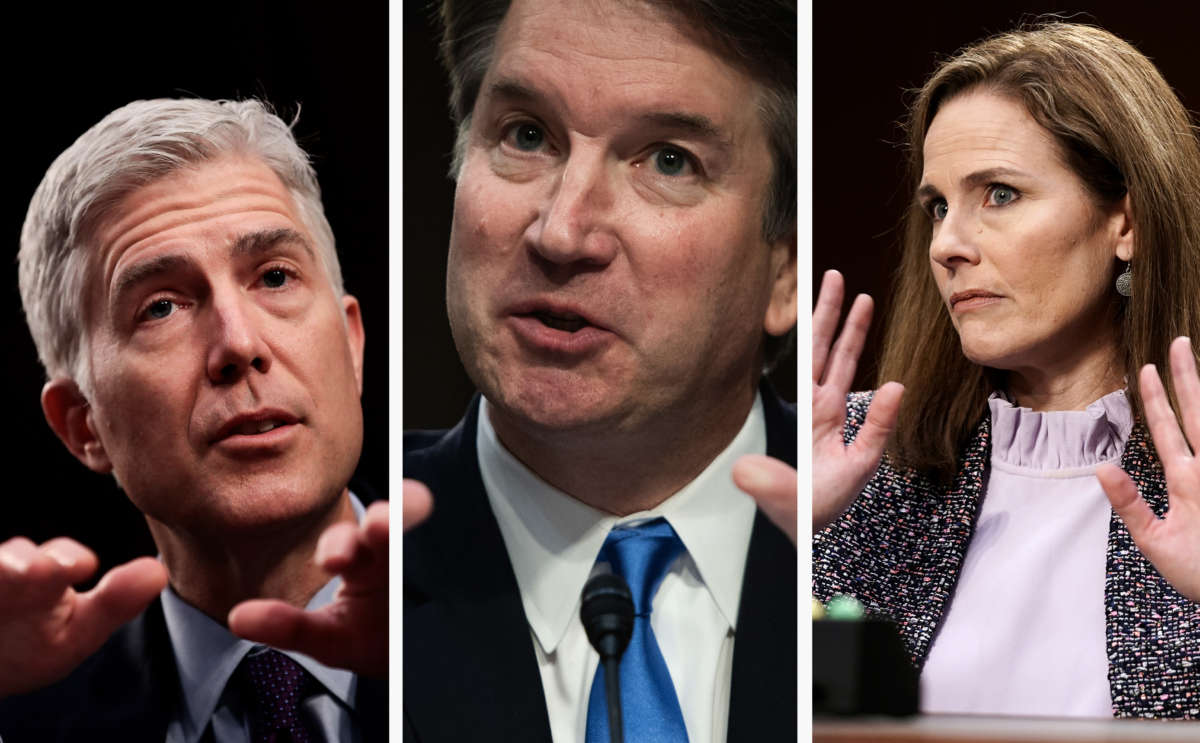Honest, paywall-free news is rare. Please support our boldly independent journalism with a donation of any size.
Following the leak of a draft opinion of the U.S. Supreme Court indicating that the institution is set to overturn Roe v. Wade, the landmark 1973 ruling making abortion legal throughout the U.S., more attention has been given to three specific justices who have likely endorsed that opinion — and what they said during their confirmation hearings just a few years ago.
The draft order says it represents the majority opinion of the High Court. With all three liberal bloc justices likely to vote against it — and reports indicating conservative Chief Justice John Roberts was also unlikely to support completely dismantling the established precedent — the remaining five conservative bloc members are the most likely to potentially upend Roe.
Three of those conservative justices — Neil Gorsuch, Brett Kavanaugh and Amy Coney Barrett — were confirmed in the past five years, under former President Donald Trump. Amid criticism and examination of how detrimental such a ruling could become, renewed scrutiny has been given to those three justices in particular, as their appointments directly led to the possibility of Roe being officially overturned later this year.
All three justices, as nominees at the time, gave answers indicating they would give deference to the nearly 50-year-old precedent protecting abortion rights. Their private conversations with lawmakers, too, are inconsistent with what appears to be their ruling on dismantling Roe.
In 2017, Gorsuch was nominated by Trump, who had himself promised only to select anti-abortion nominees to the Supreme Court. Gorsuch sought to assure senators tasked with approving him that he would not take the issue of abortion lightly, telling them during his hearings that he would have “walked out the door” had the former president demanded he overturn Roe.
In an exchange with Sen. Dick Durbin (D-Illinois) during those same hearings, Gorsuch was asked whether he agreed with specific findings from Roe, including the idea that, for the purposes of the 14th Amendment’s interpretations, a fetus is not a person.
“Do you accept that?” Durbin asked.
“That is the law of the land. I accept the law of the land, senator, yes,” Gorsuch responded.
In 2018, Kavanaugh also described Roe in similar terms. In private discussions with Sen. Susan Collins (R-Maine), she said that the nominee had told her that the case and others like it protecting abortion rights were “settled law.”
Kavanaugh tweaked that language a little bit during his hearings, but what he did say seemed to match what Collins suggested: that he believed Roe was mostly settled precedent.
“It is settled as a precedent of the Supreme Court, entitled the respect under principles of stare decisis,” Kavanaugh said. He added:
The Supreme Court has recognized the right to abortion since the 1973 Roe v. Wade case. It has reaffirmed it many times.
And while Barrett tried to avoid calling Roe a super-precedent — a type of precedent that is seen as untouchable, in terms of how much harm it could cause if reversed — she herself acknowledged that her opinion on its status “doesn’t mean that Roe should be overruled.”
Taken together, these statements imply that the three justices, when they were nominees being considered by the Senate to serve on the nation’s highest court, would take a cautious approach to changing Roe’s abortion protections, if they took any action on the matter at all. Instead, all three appear to have eagerly signed on to a draft order (authored by Justice Samuel Alito, another anti-abortion member of the conservative bloc) to undo the decades of precedent at the very first opportunity that presented itself.
Several lawmakers have spoken out against the draft order, stating that, if it indeed becomes the opinion of the Supreme Court when it comes to abortion rights, it was done so erroneously and without consideration of precedent, as those justices had promised.
Collins herself has expressed disappointment in confirming Kavanaugh specifically, noting that her private conversations with him did not indicate he’d upend Roe.
“If this leaked draft opinion is the final decision and this reporting is accurate, it would be completely inconsistent with what Justice Gorsuch and Justice Kavanaugh said in their hearings and in our meetings in my office,” Collins said in a statement this week.
Speaker of the House Nancy Pelosi (D-California) and Senate Majority Leader Chuck Schumer (D-New York) blasted the draft opinion as wrongly decided. They also described the conservative justices who comprised the majority in the decision as liars.
“Several of these conservative Justices, who are in no way accountable to the American people, have lied to the U.S. Senate, ripped up the Constitution and defiled both precedent and the Supreme Court’s reputation,” Pelosi and Schumer said in a joint statement.
Trump is silencing political dissent. We appeal for your support.
Progressive nonprofits are the latest target caught in Trump’s crosshairs. With the aim of eliminating political opposition, Trump and his sycophants are working to curb government funding, constrain private foundations, and even cut tax-exempt status from organizations he dislikes.
We’re concerned, because Truthout is not immune to such bad-faith attacks.
We can only resist Trump’s attacks by cultivating a strong base of support. The right-wing mediasphere is funded comfortably by billionaire owners and venture capitalist philanthropists. At Truthout, we have you.
Truthout has launched a fundraiser, and we have only 24 hours left to raise $15,000. Please take a meaningful action in the fight against authoritarianism: make a one-time or monthly donation to Truthout. If you have the means, please dig deep.
